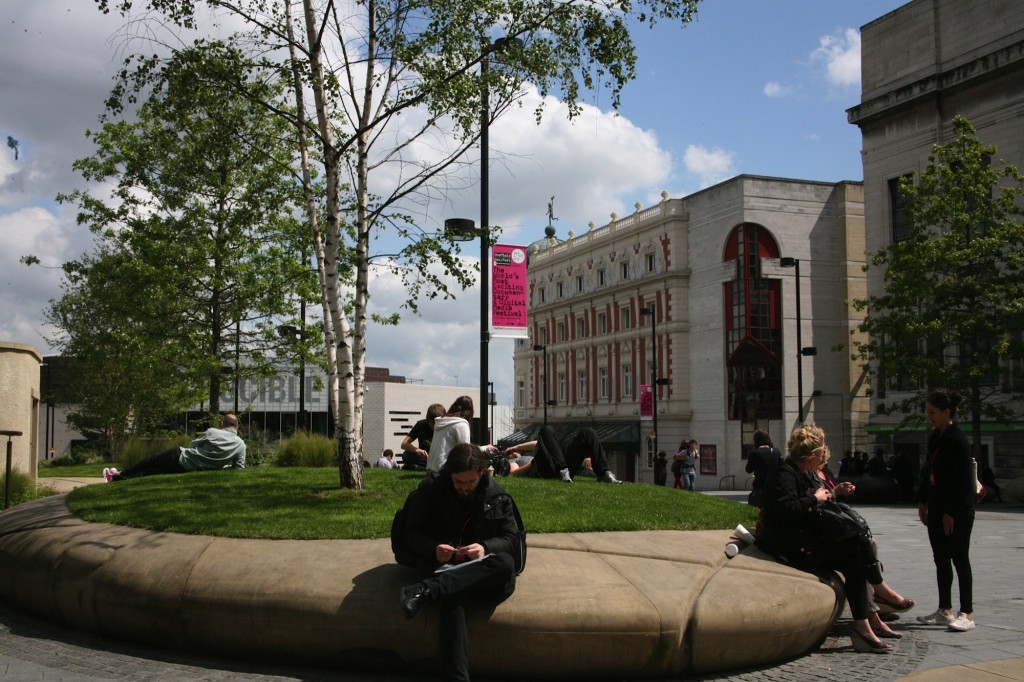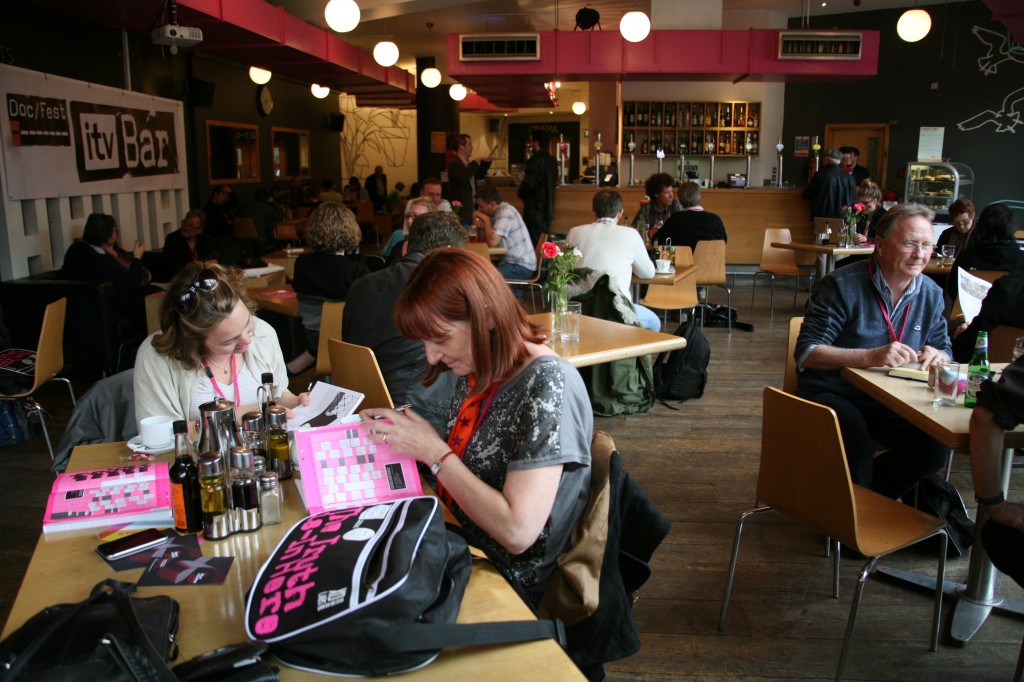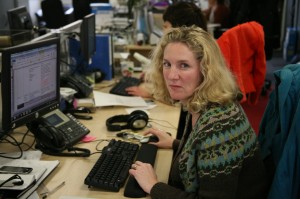5 minutes at Sheffield Doc Fest with Charlotte Fisher
June 16, 2012 @ 2:53 pm Posted in News CommentsSo I’m back in Sheffield for the 2012 Sheffield Docfest – the Cannes of factual television without the palm trees.

Charlotte Fisher can be found through the TALENT section of www.mediaparents.co.uk. Charlotte is currently working part time at Mentorn Media through Media Parents.
In less than 24 hours I’ve seen three very different but equally inspiring documentaries: The Island President, about the Maldives and global warming; Jaywick Escapes, which follows some of the characters who have washed up in this declining seaside resort; and Lost and Sound, about hearing loss and the impact of music on those who are partially or entirely deaf. I’ve been to panel sessions on 30 years of documentaries on Channel 4 and the ethics of funding your documentary and I’ve just come out of a pitching session where the winner gets £10,000 to help fund their documentary.
Having been to Sheffield Docfest last year for the first time, and taken part in a public pitch in front of four commissioning editors – this year I decided to go along as an observer instead. I wanted to be able to relax, watch some films, attend industry sessions and watch other people pitch.
Like Cannes, Sheffield Doc Fest is an international festival and there are fifteen locations around the city centre where you can watch new documentaries from all round the world from 9am until 11 at night. Or you can attend sessions with movers and shakers from the documentary and TV industry. These cover everything from funding , branded content, copyright issues, and the art of story-telling, to more niche areas like “Doc making in Post Soviet Republics” or “ Working with the Balkans” .
But pitching is one of the reasons people go to Sheffield and there are three main types: the closed sessions where pre-selected film-makers get to pitch their ideas to established executive producers or distributors and get one to one feedback, the pitches where film-makers present their trailers or proposals to an audience for feedback (and anyone in the audience can take part), and the public pitches where film-makers are shortlisted beforehand and then have three or four minutes to pitch their idea to a panel of commissioners and an audience - which can range from a handful to a couple of hundred people. The prize here is usually several thousand pounds for the winning filmmaker to help develop their project and some longer term advice from the panel.

Charlotte writes about the 'Women Mean Business' pitching session, and the Grierson pitching session at Sheffield Doc Fest.
I decided to go back to the Chapel – the venue I had pitched in for the Grierson Trust award - and watch the “ Women mean Business” pitch backed by Worldview and the Community Channel. Six filmmakers had been shortlisted to pitch an idea for a short film telling a positive story of women in business in the developing world. They had three minutes each, followed by some questions from the panel – and the winner would get £10,000 to make their short.
There were pitches about a woman in Afghanistan who had set up a furniture factory; a former prostitute in Uganda who, with one sewing machine, has set up a boutique employing other former prostitutes to keep them off the game; a midwife on a motorbike in Ghana; and a team of women clearing landmines in Cambodia.
They were all great stories, but it was the questions from the panel that were useful reminders about what we need to ask ourselves whether making a film or pitching one.
“How are you going to make us really care?” “How different is the main character at the end from the beginning of the story?” A panellist suggested to one filmmaker there was no jeopardy in her story – although he agreed it was a great story about a garage of female mechanics in a part of Africa where most women are illiterate. “You need to get a mechanic who is about to get married – someone suggested – “will they give up their job ?”
Another panellist had concerns about the narrative journey of one film –“If you’re out there at the right time you will get something great – but if you are not it could all fall down flat.” A difficulty faced by many filming projects in more remote locations.
Another film-maker was asked: “What takes this from a fascinating newspaper article to the characters needed to sustain a doc?”
After a 20 minute break the panel came back to tell us that Emma Fry (at 23 probably the youngest person pitching) had won with her project following female bomb disposal experts from the Cambodian mine action centre.
Her pitch did not go into so much detail on the actual story as some, but she was very clear – telling the panel – “I have full access “ and talking about technique, and the equipment she would use including GoPros. In some ways it was a rather clinical pitch, but I understood why, when Emma told me afterwards that she is doing an MA at Falmouth at the moment and she approached the pitch in an academic way. And it certainly worked. One of the panel told her:“I had lots of questions after I read the written proposal but you have answered them all – that’s what a good pitch should be.”
There were concerns about how long Emma would be able to spend in Cambodia to really get to know her characters – her plan is two weeks. But in the end they were impressed by her “clear and organised pitch” as well as the strength of the story, which had plenty of jeopardy as these women risk their lives every day!
Emma told me afterwards: “I felt very strongly about my story. I did really believe in it. I practised so much but I was very nervous. I wanted it so badly, but I was up against a lot of documentary professionals so I didn’t think I would be able to win. I really just came along to meet people. I had to do a 10 min pitch for my tutors for my masters degree, but that’s very formulaic. You break it down into characters, access, safety etc. So I thought I would use the best bits of that. If I was listening I would want to know exactly what was happening in as short a time as possible, getting across the passion without getting ahead of yourself.”
Emma was supposed to be flying to Cambodia to film for her MA last weekend but cancelled her ticket when she heard she’d been shortlisted at Sheffield. It cost her £600 – but she’s now got £10,000 and has booked another seat to Cambodia this Sunday.
Another finalist, Ruth, pitched with me for the Grierson award last year and so I wondered how it was pitching a second time round – although of course this time she was telling a different story.
“I love the story and the characters and I loved the pitch, I enjoyed it today more than last time. It was a nice atmosphere. Talking to each other beforehand. Everyone said the same thing. Just enjoy it. But if I’m thinking about ways to improve I’ve learned from really listening to other people’s pitches. If you are going to pitch, really go and listen to other people. Apart from that it’s all about preparation. Preparing and feeling calm before you start. ”
This time last year I was in the same venue pitching my own documentary idea. I’d spent the preceding weeks metaphorically biting my nails and pacing up and down, as I prepared for my first proper, and public, pitch. Having worked as a reporter in news and current affairs for over a decade, I had never had to pitch an idea before. At least not formally in front of a panel of four commissioning editors – oh and did I mention the 150 spectators?!
Up until that point, pitching meant phoning the editor or head of news, saying I’d like to do a news piece or feature or half hour on…whatever it was… then putting a few lines in an email and waiting for a yes or no.
But pitching at Sheffield Doc Fest is something totally different. First I had to write a formal documentary proposal. I wasn’t too worried about getting down to the final six who had to pitch, as hundreds of people would be applying who had far more experience than me but I reasoned it would be good practice. Fast forward to expression of shock, brief pleasure and immediate regret on receiving the email from Grierson and DFG congratulating me on being chosen as one of six finalists.
So I started work on my four-minute pitch – to be accompanied by a power point presentation of slides. Guess whether I had needed to do a power point presentation in news – or ever before? This was going to be a challenge on all fronts.
My mentor Will Hanrahan was very supportive and Nicola Lees at WFTV got me to practice in front of her and timed me. In this type of pitch forum if you go over the allotted time the panel will ring a bell and cut you off. This is not considered a good outcome. Nicola also told me I need to do it live from memory. Thing is, although I’d been reporting for years, in that arena you can’t see the people watching you. And although in TV news the gallery gives you a 30 second and 10 second count - they don’t usually cut you off mid-sentence.
I did my pitch to time – the powerpoint went as if I’d spent my life in conference halls and I felt it had gone as well as could be expected. Then the panel started asking their questions . I was prepared to describe the technical aspects of 3D filming, the type of cameras we would use, the budget and so on. So I was relieved when I was asked about access. This was not complicated and I had the access.
“How long have you spent with these women?” I was asked. “Oh, a couple of days,” I said happily – after all in news I’d normally have about 20 minutes over coffee to warm someone up before filming them cleaning their teeth and then doing a quick a interview.
My smile disappeared fairly quickly as I took in the shocked silence. This was not the right answer. The questions that followed were straightforward, although there was a suggestion that my 3D project was too ambitious and that maybe the timing wasn’t right.
I then sat down and listened to the other five pitches. None of them pitched from memory – all used their laptops or cards as reminders – note to self : doing it this way would massively reduce the stress. But more importantly perhaps they were the kind of projects that were likely to bring tears to people’s eyes. Ironically the kind of projects I would normally be wanting to make myself. But when one of the pitches actually did make one of the panelists cry, I knew I could not win. And as one man explained how he had already spent months filming with his subject – who was also his brother – I also understood very clearly that spending two days with my girls was not going to cut it.
This year though, I could watch people pitching in an objective way – I am not worrying about my own project and I can see what works and what doesn’t. I wish Emma Fry, and the others who pitched, the best of luck with their films.

Charlotte Fisher back at work after a career break, and a career change from news to factual thanks to Media Parents. Charlotte can be found in the TALENT section of www.mediaparents.co.uk

